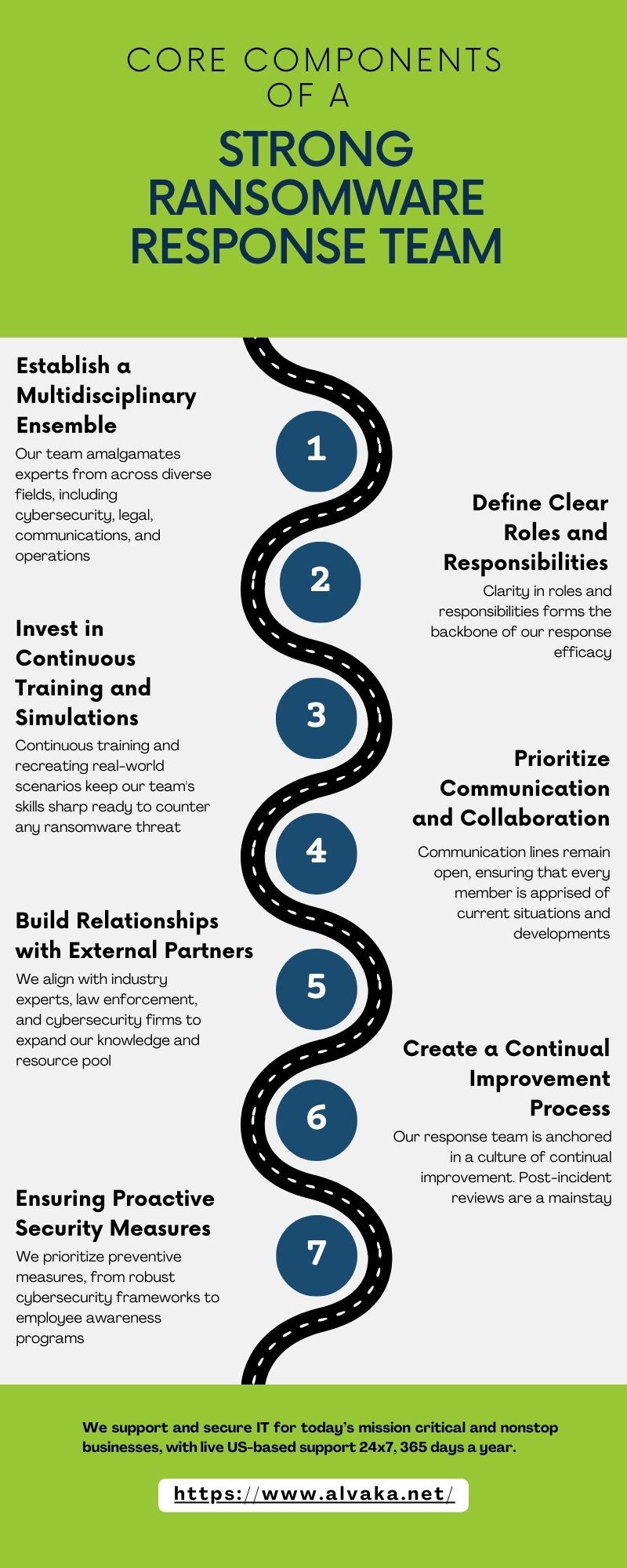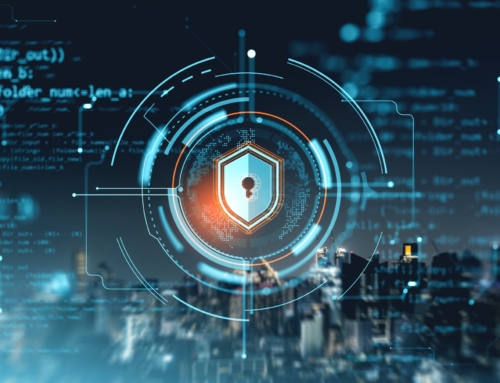Forming an Effective Ransomware Response Team: Key Steps
Understanding the Threat of Ransomware in Today’s Digital Landscape
Amid the evolving digital landscape, ransomware has emerged as a formidable threat to organizations of all sizes. At Alvaka, we recognize the critical nature of these attacks, which can cripple critical infrastructure, exfiltrate sensitive data, and cause debilitating downtime. The need for a reliable ransomware response team has never been more pressing, as recent statistics depict a stark escalation in ransomware incidents, with enterprises experiencing substantial financial losses and reputational damage. Recognizing this imminent danger is the first step in fortifying your security posture against a landscape where a proactive defense is not just recommended but essential for survival.
Defining the Role of a Ransomware Response Team
Our dedicated Ransomware Response Team serves as a strategic line of defense against the rising tide of cyber extortion. Equipped with specialized skills and a comprehensive understanding of threat vectors, our team is designed to not only respond swiftly to active ransomware incidents but also to implement post-attack strategies to mitigate risk and bolster resilience. This integration of responsive and preventive measures is crucial to ensuring the integrity of your IT management and network services in the face of ever-evolving cyber threats.
Preparing to Build Your Ransomware Response Team
In readiness for assembling a robust Ransomware Response Team, we begin by evaluating your organization’s existing cybersecurity measures. This involves thorough risk assessments to identify vulnerabilities and the creation of a tailored incident response plan. Collaboration is at the heart of our approach, bringing together expertise spanning internal departments and forging alliances with trusted external partners. Our methodical preparation guarantees that every aspect of your organization’s defense grid is scrutinized, ensuring that the team you place at the helm is equipped with a deep understanding of potential threats and the varied expertise necessary to counter them effectively.
Core Components of a Strong Ransomware Response Team
1. Establishing a Multidisciplinary Ensemble
In assembling an efficacious ransomware response team, we recognize the necessity of a multidisciplinary approach. Our team amalgamates experts from across diverse fields, including cybersecurity, legal, communications, and operations. We ensure that each member brings specialized knowledge to address the full spectrum of a ransomware crisis. Furthermore, this kind of squad is primed for rapid response, equipped to tackle threats from detection to resolution with precision and agility.
2. Defining Clear Roles and Responsibilities
Clarity in roles and responsibilities forms the backbone of our response efficacy. Upon induction, each member is acquainted with their specific duties. In the throes, IT professionals focus on containment and eradication of threats, legal experts concentrate on compliance and implications, while communications specialists manage stakeholder interactions. Consequently, when ransomware strikes, we are poised for a coordinated and efficient reaction.
3. Investing in Continuous Training and Simulations
To fortify our capabilities, we continually invest in training and simulation exercises. These initiatives keep our team’s skills sharp and ready to counter any ransomware threat. During these simulations, we recreate real-world scenarios, which helps us to identify potential weaknesses and enhance our strategies. Moreover, it nurtures a culture of resilience and perpetual readiness within our ranks.
4. Prioritizing Communication and Collaboration
Collaboration is the cornerstone of our ransomware response team’s success. Communication lines remain open, ensuring that every member is apprised of current situations and developments. Regular briefing sessions and joint decision-making frameworks foster a unified response. Given the propensity of ransomware to evolve, this ongoing partnership is indispensable to staying ahead of threats.
- Collaborative assessment of the threat landscape
- Development of a cohesive incident response plan
- Frequent updates and adjustments in strategy according to emerging threats
5. Building Relationships with External Partners
How to Form an Effective Ransomware Response Team includes extending beyond our internal resources, as we build relationships with external partners. We align with industry experts, law enforcement, and cybersecurity firms to expand our knowledge and resource pool. This strategic alliance not only bolsters our response capability but also grants us access to cutting-edge intelligence and technologies.
6. Creating a Continual Improvement Process
Our response team is anchored in a culture of continual improvement. Post-incident reviews are a mainstay, allowing us to dissect our response and extract valuable lessons. Consequently, not only do we address lapses, but we also celebrate successes, always iterating on our processes to bolster our digital defenses.
7. Ensuring Proactive Security Measures
Proactivity is at the heart of our defense strategy. We prioritize preventive measures, from robust cybersecurity frameworks to employee awareness programs. Regularly updated defenses coupled with vigilant network monitoring serve as our bulwark against the tide of ransomware threats. Hence, our response team functions not solely as a reactive unit but as architects of a formidable digital fortress.
Keys to Crafting a Skilled Ransomware Response Squad
When contemplating the keys to crafting a skilled ransomware response team, remember that the strength of such a team lies in preparation, adaptability, and collaborative effort. At Alvaka, we encapsulate these ideals, forging a response team that not only confronts challenges but also anticipates them, ensuring that our clients’ digital assets are safeguarded with the highest regard for security and efficiency.
Did you know? A robust Ransomware Response Team typically includes roles such as Incident Response Manager, Security Analysts, IT Staff, Legal Counsel, and PR specialists to manage the aftermath of an attack.
Strengthening Your Shield Against Cyber Extortion
Consolidating Our Strategy for Robust Ransomware Defense
As we conclude our discourse on how to form an effective ransomware response team, it’s imperative to emphasize the significance of diligent preparation and swift action. Our collective experience and expertise at Alvaka are the keystones in supporting businesses to navigate the treacherous realm of cybersecurity threats. By assembling a skilled and dedicated ransomware response team, your organization will not only mitigate risks but also build a resilient digital fortress capable of withstanding the onslaught of cyber extortion.
Envisioning a Future-Proof Cybersecurity Posture
In foreseeing the future of cybersecurity, it’s clear that ransomware will continue to evolve and test the fortitude of our cyber defenses. Our proactive stance and readiness to adapt are what will differentiate our clients from those left vulnerable to these pervasive threats. With our guidance on how to form an effective ransomware response team, we commend companies for taking the indispensable step towards cybersecurity empowerment.
At Alvaka, we envision a partnership that extends beyond the immediate crisis. We’re steadfast in providing continuous support and resources that contribute to the long-term protection and recovery capability of your systems. Embrace our expertise, and together, we’ll safeguard the integrity and continuity of your business operations.
Commitment to Collaboration and Continuous Education
Commitment to relentless collaboration and continuous education anchors the effectiveness of any ransomware response team. We understand the gravity of staying ahead of the curve, and with that knowledge, we nurture a culture of constant learning. Our team remains at the forefront of the latest threats and response strategies, ensuring that your defense mechanism never falls behind.
Alvaka: Your Ally in Ransomware Recovery
As you reinforce your cybersecurity battlefield, remember that Alvaka is your staunch ally in ransomware recovery. Our expert response team is equipped with the necessary tools and knowledge to swiftly neutralize threats and aid in the recovery process. By collaborating with us, you gain access to a wealth of cybersecurity insights and a team that is fully committed to your defense against digital extortion.
Engage with Alvaka today and let us help you build an impregnable cyber shield. With our specialized services, from IT management to network services, we ensure that your journey on how to form an effective ransomware response team translates into a secure and prosperous digital future for your business.
CISA Ransomware Response Checklist
FAQ
What are the primary threats posed by ransomware in today’s digital environment?
In today’s digital environment, ransomware presents a significant threat by encrypting an organization’s data and demanding payment for its release. Recent attacks have led to substantial financial losses, operational disruptions, and reputational damage. Consequently, maintaining vigilance and implementing robust security measures is crucial for safeguarding digital assets.
What impact have recent ransomware attacks had on businesses?
Ransomware attacks have escalated, resulting in dire consequences for businesses, including downtime, financial strain due to ransom payments, data loss, and potential legal ramifications. Furthermore, businesses may suffer from diminished customer trust and disruptions to their supply chain, underscoring the need for an effective response team.
Why is it essential to have a ransomware response team?
Having a dedicated ransomware response team is essential because it ensures a structured and efficient approach to managing and mitigating ransomware incidents. This specialized team facilitates prompt action, minimizes damage, and aids in recovery, significantly contributing to the organization’s resilience against such cyber threats.
Who should be included in a ransomware response team?
A ransomware response team should include members with diverse skills and expertise, including IT security professionals, network engineers, legal advisors, communication specialists, and key decision-makers from within the organization. Additionally, external partners such as cyber insurance providers and law enforcement may play critical roles.
How does a ransomware response team fit into overall IT management?
A ransomware response team complements overall IT management by focusing specifically on the threat of ransomware. This team works in conjunction with other IT and network services to ensure a cohesive strategy for prevention, detection, response, and recovery from ransomware attacks. Essentially, it elevates the organization’s cybersecurity framework.
What steps should we take to evaluate our current cybersecurity posture?
To evaluate your cybersecurity posture, conduct a comprehensive risk assessment, review existing security policies and controls, and perform penetration testing. Additionally, ensuring employee awareness and training on cybersecurity best practices is a must for a well-rounded evaluation.
What expertise should members of a ransomware response team possess?
Members of a ransomware response team should possess expertise in cybersecurity, incident response, digital forensics, legal issues concerning data breaches, and crisis communication. Equally important is their ability to quickly make informed decisions during high-pressure situations to effectively counteract a ransomware incident.
How should we prepare our team for a ransomware attack?
To prepare your team for a ransomware attack, establish and regularly update an incident response plan, conduct frequent training exercises and simulations, and ensure continuous monitoring for ransomware threats. Moreover, maintain regular backups and implement robust access controls and network segmentation to limit the spread of an attack.
Should we consider cyber insurance as part of our ransomware response planning?
Absolutely. Cyber insurance should be considered an integral part of your ransomware response planning. It can provide financial assistance in the event of an attack, cover the costs related to response efforts, and offer access to valuable post-incident resources and support.
How do we coordinate with external partners during a ransomware incident?
During a ransomware incident, coordinate with external partners by establishing predefined communication channels and protocols. Ensure that roles and responsibilities are clearly defined, and external partners such as cybersecurity experts, legal counsel, and law enforcement are engaged early on to help manage the incident effectively.









 Smoke testing is a term used to describe the testing process for servers after patches are applied.
Smoke testing is a term used to describe the testing process for servers after patches are applied.  This is a basic cost calculator for you to compute your typical monthly cost for patching your servers, PCs, laptops, tablets and associated application software. It also forms the basis for you to begin calculating your Return on Investment for software patching, or for comparison with alternatives to the manual process of patching operating systems and application software—such as Patch Management as a Service, also known as Vulnerability Management as a Service.
This is a basic cost calculator for you to compute your typical monthly cost for patching your servers, PCs, laptops, tablets and associated application software. It also forms the basis for you to begin calculating your Return on Investment for software patching, or for comparison with alternatives to the manual process of patching operating systems and application software—such as Patch Management as a Service, also known as Vulnerability Management as a Service.